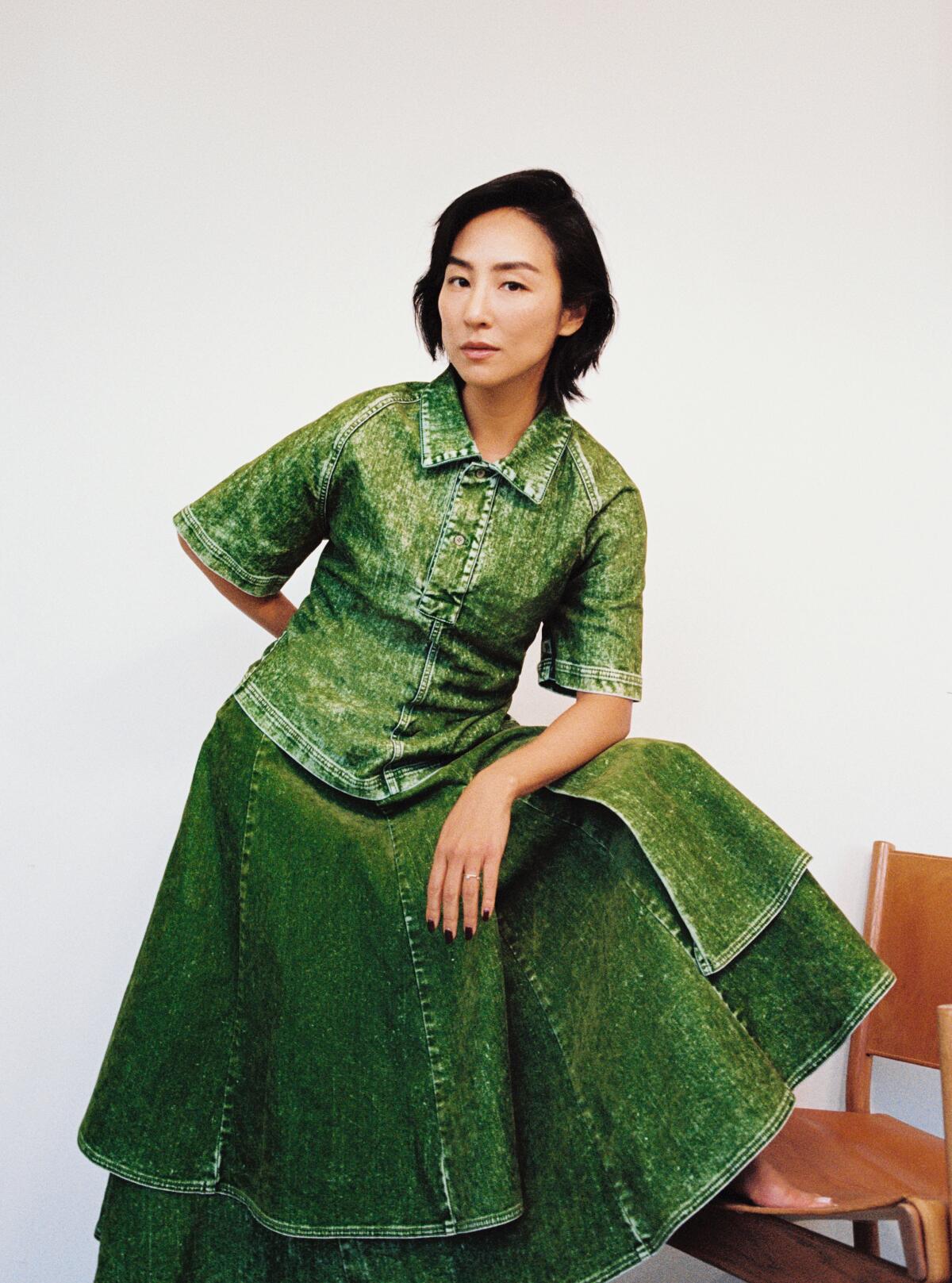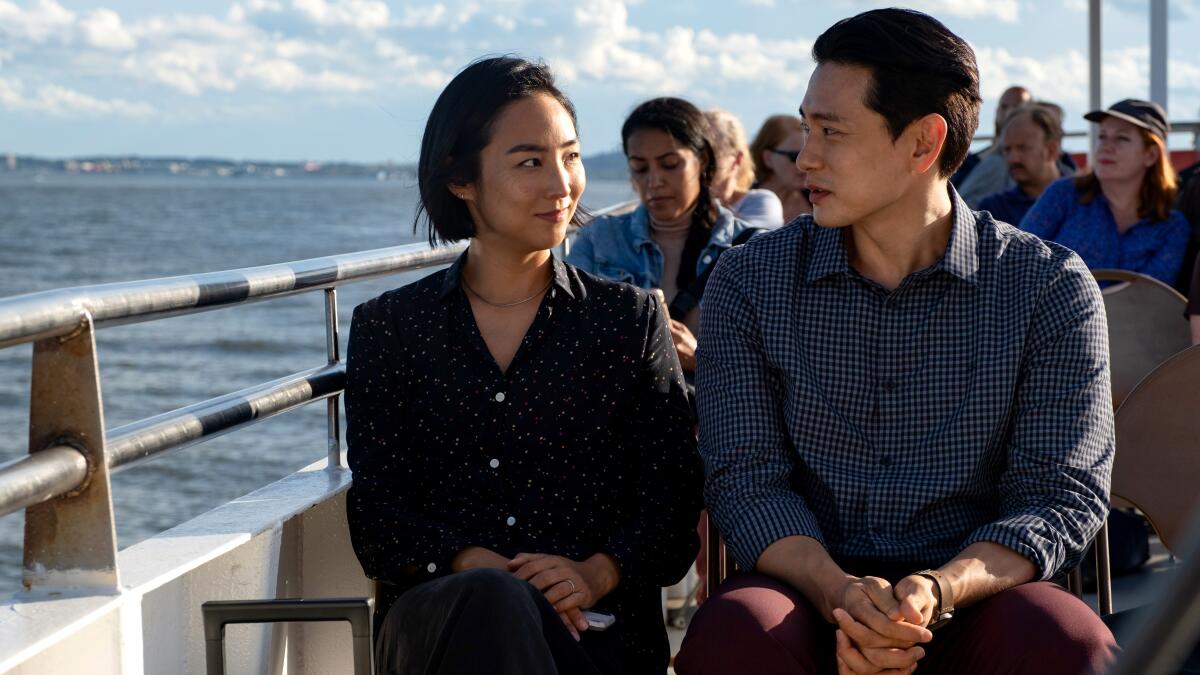How Greta Lee, not Greta Gerwig, came to star in ‘Past Lives’

- Share via
Toward the end of the Sundance premiere of “Past Lives,” star Greta Lee heard a strange noise reverberating through the Eccles Theater. Her heart sank. “The [audience was] fidgeting, like, moving their feet. I thought, ‘We lost them.’ Everyone was trying to leave.” Then it dawned on her: It was the sound of overwhelming feeling for writer-director Celine Song’s contemplative, delicately moving film about a pair of childhood sweethearts (Lee, and Teo Yoo) who meet again as adults. “People were crying. That was totally out of body. I couldn’t believe it was happening,” says Lee, who made a name for herself as a scene-stealer on such TV shows as “Russian Doll” and “The Morning Show.” Having never carried a film, certainly not one in both English and Korean, Lee turns in a performance that critics praised as “remarkable” as well as “terrific and subtle.”
Bad scripts are part and parcel of being an actor. What’s it like to read a great one?
I had no idea who Celine was, even though we share a theater background and we’re both Korean Americans. There was a note with the script that asked, “Do you speak Korean?” But almost immediately the language in the script was so radically different from everything else I’d read in a long, long time. There was a poetry and maturity, a very developed voice. I was astounded it was coming from a first-time filmmaker.
What did you see as the role’s primary challenge?
From her own immigrant experience to an actual night in a New York speakeasy, Celine Song explains how real life shaped her debut feature, starring Greta Lee.
How to execute quiet, intimate scenes that also feel monumental. That reminded me of so many other films I watched as a young person that made me excited to participate in filmmaking: the “Before Sunrise” trilogy or “In the Mood for Love,” and beyond that European films, movies with grace and dignity, but also accessible. And it was all wrapped up in this crazy script that just landed in my inbox.
Part of the miracle that is “Past Lives” is what followed after putting yourself on tape.
Yes, after having this tremendously powerful, intimate experience, I didn’t get the job. Other actors were cast. [Also there’s] a funny little glitch.
Which was?
I got a voicemail message [telling me] there was big news. For some reason I assumed it was that I got this job. But it was for Greta Gerwig. An assistant mixed up our contacts and left a message saying, “We got big news!” The humiliation I endured in playing that message over and over again for my agents, saying, “Is she saying Gerwig?” Basically it was like getting punched by the universe.
A year passes. Your phone rings — and this time it’s for the right Greta. What had changed?
[Originally] Celine envisioned the movie to end with the characters in their late 20s — that’s the age she was when she experienced the real events this movie is based on. Then she realized that she wanted to make a more grown-up film. That required aging up the characters, which is where I came in! [Laughs] Completely out of the blue, I got a phone call saying, “Can you meet with Celine Song right now?” I jumped on Zoom and we fell in love.

Talk about going from the high-energy “Morning Show” to the stillness of “Past Lives.”
It was like going from Sorkin, where dialogue is the bread and butter, to something completely different. It’s hard to make a value judgment on what is harder. But I was deeply humbled by how challenging and ultimately satisfying it was to do work requiring a completely different set of muscles. A lot of silence takes so much specificity and detail. To not fill the space with words takes restraint and an extraordinary amount of trust and prep. I used to fill that silence with lots of jokes. I’ve often worn crazy costumes. I don’t want to [call them] distractions. But things I could rely on. And this was supremely exposing. I felt very naked.
What was Day One of production like?
For 20 years [I’d been] navigating all kinds of side doors, trying to create my own curriculum. Like, how am I going to be the best version of myself when there are only certain opportunities available? I’m going to get creative. I’m going to do sketch comedy, do this weird play in London, do a musical that no one’s paying attention to. I like to think that on some level I wouldn’t have had the creative confidence to do “Past Lives” if I hadn’t taken that journey. That’s why I see this as the role of my lifetime. [Celine Song] gave me the space to use my full facility, no strings attached, and without being burdened by having to do this extraneous labor. Just getting to act.
Has this changed your idea of the possibilities for you out there?
Yes. I feel so much clarity. There’s a bit of heartbreak involved once you start accepting that certain realities exist, that based on certain inequities and what’s available that maybe I wouldn’t have the kind of career I had initially imagined for myself. I believe the Stanislavski thing that there are no small parts. I built an entire career out of that that I’m really proud of. But there was a part of me that was trying to accept that maybe I wouldn’t get to play ball. Then I got to. And now I can’t go back. Doing this movie reinvigorated my belief that we should fight for these kinds of movies and that we can’t just assume that they’re going to happen. We can’t just be complacent. So now I feel completely different. I feel very hopeful in terms of what audiences are wanting and are capable of receiving.
More to Read
Sign up for The Envelope
Get exclusive awards season news, in-depth interviews and columnist Glenn Whipp’s must-read analysis straight to your inbox.
You may occasionally receive promotional content from the Los Angeles Times.











